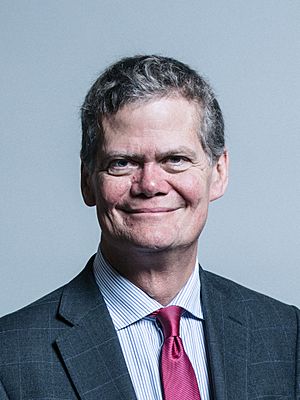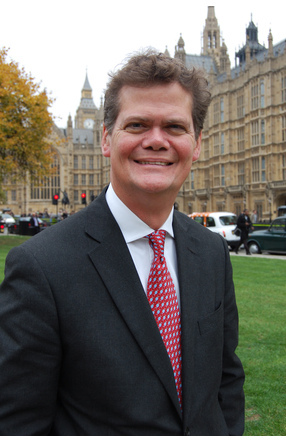Stephen Lloyd facts for kids
Quick facts for kids
Stephen Lloyd
|
|
|---|---|

Lloyd in 2019
|
|
| Liberal Democrat Spokesperson for Work and Pensions | |
| In office 16 June 2017 – 6 December 2018 |
|
| Leader | Tim Farron Vince Cable |
| Preceded by | Baroness Bakewell |
| Succeeded by | Christine Jardine |
| Parliamentary Private Secretary to the Secretary of State for Energy and Climate Change | |
| In office 9 January 2014 – 12 December 2014 |
|
| Prime Minister | David Cameron |
| Preceded by | Steve Gilbert |
| Succeeded by | Paul Maynard |
| Member of Parliament for Eastbourne |
|
| In office 8 June 2017 – 6 November 2019 |
|
| Preceded by | Caroline Ansell |
| Succeeded by | Caroline Ansell |
| In office 6 May 2010 – 30 March 2015 |
|
| Preceded by | Nigel Waterson |
| Succeeded by | Caroline Ansell |
| Personal details | |
| Born | 15 June 1957 Mombasa, Kenya Colony |
| Nationality | British |
| Political party | Parliamentary affiliation: Independent (2018–2019) Liberal Democrats (until 2018, 2019–) Party membership: Liberal Democrats |
| Domestic partner | Cherine Maskill (2003–present) |
| Education | St. George's College, Weybridge |
| Occupation | Business Development Director |
Stephen Anthony Christopher Lloyd (born 15 June 1957) is a British politician from the Liberal Democrat party. He has served as a Member of Parliament (MP) for Eastbourne twice. An MP is a person elected to represent a specific area (called a constituency) in the House of Commons, which is part of the UK Parliament.
Stephen Lloyd was born in Kenya. He went to school in Surrey, UK. Before becoming an MP, he worked in business, helping companies grow. He lived in Eastbourne before he first tried to become an MP there in 2005. He was elected as the MP for Eastbourne in 2010. He served until 2015, supporting the government at the time.
He lost his seat in 2015 but won it back in 2017. During this time, he was the Liberal Democrat spokesperson for Work and Pensions. In 2018, he decided to leave his party's group in Parliament. This was because he felt his party's view on Brexit was different from a promise he made to his local area. He then sat as an independent MP. He rejoined the Liberal Democrats in 2019 but lost his seat again in the 2019 election.
Contents
Early Life and Work
Stephen Lloyd was born on 15 June 1957 in Mombasa, which was then part of Kenya. His parents were John and Nuala Lloyd. When he was eight, he moved to the UK for school. He attended St. George's College, Weybridge in Surrey.
Stephen Lloyd has a hearing impairment. When he was six, he got measles. This caused him to lose all hearing in his left ear. He only has some hearing in his right ear.
Before he became an MP, Lloyd worked in business for over 20 years. From 1977 to 1980, he worked as a commodity broker. This means he helped buy and sell raw materials like metals or crops. Later, he worked in business development, helping companies like the Grass Roots Group and the Federation of Small Businesses grow.
Political Journey
First Steps in Politics
Stephen Lloyd first tried to become an MP in 2001. He stood for the Beaconsfield area. He came in third place in that election.
In 2002, the Liberal Democrats chose him to be their candidate for Eastbourne. This area was seen as a good chance for the party to win. Lloyd spent three years working on local issues. He wanted to be ready for the next election. In the 2005 election, he lost to the Conservative MP, Nigel Waterson.
Lloyd kept working on local campaigns. For example, he led a group against plans to build a large B&Q store. The local council later refused permission for the store.
First Time as an MP
In the 2010 election, Lloyd focused on local issues. He also talked about the expenses of his opponent, Nigel Waterson. Lloyd asked people who supported the Labour and Green parties to vote for him. The leader of the Liberal Democrats, Nick Clegg, even came to support him. On 7 May, Lloyd was elected as the MP for Eastbourne. He won by 3,435 votes.
After the election, Nigel Waterson sued Lloyd for libel. This means he claimed Lloyd had written untrue things about him. In 2011, a court first ruled against Lloyd. But in 2013, a higher court, the Court of Appeal, changed the decision and ruled in Lloyd's favour.
From 2010 to 2015, Lloyd was the Liberal Democrats' spokesperson for Northern Ireland. He also served on the Work and Pensions Select Committee. This committee looks closely at how the government handles work and welfare. He pushed for changes to help people with reduced mobility keep their special vehicles.
In 2010, Lloyd also asked the government to rethink new rules for student visas. He argued that it made no sense to require foreign students to speak English before they came to study it.
During his first time in Parliament, Lloyd led several all-party parliamentary groups (APPGs). These are groups of MPs from different parties who focus on specific topics. He chaired groups for Citizens Advice, apprenticeships, and further education. He was also a vice chair for groups on deafness, mental health, and older people.
Lloyd started the APPG on religious education in schools in 2010. He worked to improve teaching about the world's major faiths and non-religious views. A leader in religious education praised him for promoting this important teaching.
From 2014, Lloyd worked as a special assistant to the Secretary of State for Energy and Climate Change. He resigned from this role in December 2014. He was disappointed that plans for the A27 road did not meet local needs.
Lloyd usually supported the government he was part of. One time he did not was when he voted against increases in tuition fees. He later said his party should have fought harder on that issue.
Losing and Winning Again
In the 2015 election, Lloyd lost his seat. Caroline Ansell, a Conservative candidate, won by 733 votes. After this, Lloyd said he would leave politics. However, local people started a campaign to raise money for him to stand again. Lloyd refused the money and asked them to donate to a local hospital campaign instead. He then took a job as a business development director.
In 2016, Lloyd announced he would try to become an MP again. He changed his mind after local supporters asked him to stand.
Back in Parliament
Lloyd stood in the 2017 election. This was a "snap election," meaning it was called unexpectedly. He won, beating Caroline Ansell by 1,609 votes. He was chosen from a special list of candidates who were all disabled. This was a first for a political party. In June 2017, he became the Liberal Democrat spokesperson for the Department for Work and Pensions. He kept this role when Sir Vince Cable became the new party leader. In 2018, Lloyd led a debate about how Universal Credit affects rented homes.
Helping His Community
Stephen Lloyd has worked hard for his local area. He has campaigned for better roads and to keep services at Eastbourne District General Hospital. He also fought against cuts to school budgets and social care for adults. In 2017, he organized a campaign to deliver hundreds of presents to elderly and vulnerable people in hospital during Christmas.
In 2010, Lloyd set up an "MP's Commission." This group included local business and community leaders. They helped bring back the Eastbourne 'Sunshine' Carnival. They also held a conference to help local businesses work more with public services. In 2011, Lloyd started a successful apprenticeship program. It aimed to create 100 apprenticeships in 100 days in Eastbourne. The program created 181 apprenticeships and was praised by the Prime Minister, David Cameron.
In 2014, a newspaper called The Guardian said that Lloyd's hard work had earned him a lot of support. Another newspaper, The Independent, said that politicians like him showed how good the political system could be.
In 2015, Lloyd helped the parents of a five-year-old girl who died in his area. The girl's grandparents were not allowed visas to come to the UK for her funeral. Lloyd offered to personally promise they would return to Zimbabwe.
His Beliefs
Economy
Stephen Lloyd sees himself as a "business-wing" liberal. This means he generally believes in less government control over businesses. However, he thinks there should be more rules for investment banking. He strongly supports apprenticeships as a good career path, not just university. He suggested creating a 'Royal Society of Apprentices' to make apprenticeships seem more important.
Welfare Support
In 2013, Lloyd wrote about his views on welfare. Welfare is the system that provides help to people who need it. He believed that government programs like the Work Programme and Universal Credit could help people find jobs. Even though he supported these changes, he often told the Employment Minister not to use negative words when talking about unemployed people.
European Union
Lloyd voted to stay in the European Union in the 2016 referendum. However, he later said he would "respect the result" of the vote. He also said he would not support another referendum on the UK's membership. This was different from his party's official policy. Most voters (57%) in his Eastbourne area voted to leave the European Union.
On 6 December 2018, Lloyd left the Liberal Democrat group in Parliament because of Brexit. He wrote that he had promised his area he would accept the referendum result. He also promised to support the deal the Prime Minister made with the EU. He said he would not support calls for a second referendum. He felt he had to keep his word to his town. So, he decided to leave the party's group in Parliament.
However, when the 2019 general election was announced, Lloyd confirmed he was committed to remaining in the European Union.
Images for kids



